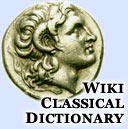
Alexander's Death
General discussions | Typhoid fever? | West Nile Virus? | Murdered by Ptolemy? | Murdered by Roxane? | Hellebore? / Documentary: Alexander The Great's Mysterious Death | Other theories
Editorial comment: The web distorts. If something's not new, it sometimes scarcely registers on the web. Among scholars, although typhoid has gained traction, the dominant theory is still probably malaria (aggravated by a generally ragged state of health). But this theory is almost completely absent from the web. More generally, on-line and off we don't get much in the way of methodology. The various doctors who join the debate treat the textual tradition as simply data. But Alexander's death was such a white-hot event—a locus of accusation and counter-accusation—that truth cannot be disentangled from untruth and spin. It's likely the truth is simply unknowable. My condolences, and welcome to ancient history!
General discussions
Pothos: Alexander's Death. Summary by Irina Frasin.
Alexander's final days: a Babylonian perspective by Jona Lendering.
Pothos.org: Legends (Death). Nick Welman reviews Medieval legends, and notes the myth-making continues:
"Recently a message in the 'Forum' suggested Alexander may have died from a bite of his pet monkey. That is even weirder than anything recorded here."
Random people answer the question, some serious, some not. The internet needs an editor!
Typhoid fever?
Web Archive: "A Mysterious Death," The New England Journal of Medicine (v. 338 n. 24) by Borza and Drs. Oldach and Benitez.
Letter in reply to "A Mysterious Death" by Dr. S.D. Moulopoulos and others, with a reply to the replies by the authors getting at the source-critical problems.
![]()
"Alexander the Great Died of Typhoid Fever" by Niel Rolfe Chamberlain for Suite 101.
Abstract: "The death of Alexander the Great: malaria or typhoid fever?" by Cunha Ba, Infect Dis Clin North Am. (March 2004).
"Alexander most likely died from malaria or typhoid fever, which were rampant in ancient Babylon. The description of his final illness from the royal diaries is consistent with typhoid fever or malaria but is most characteristic of typhoid fever."
"What killed Alexander the Great? Maybe typhoid fever" (AP report). Also here.
BBC News: "Alexander's death riddle is 'solved'" on typhoid theory.
"Intestinal Bug Likely Killed Alexander the Great" (June, 1998) press release from the University of Maryland.
Did Alexander die of Typhoid? MSNBC report based on New England Journal of Medicine.
Augusta Chronicle picks up AP story on Typhoid.
West Nile Virus?
"Alexander the Great and West Nile Virus Encephalitis" by John Marr and Charles Calisher, Emerging Infectious Diseases Journal (Dec. 2003). Article reviews various explanations. The West Nile explanation is based on Plutarch:
"When when he came to the walls [of Babylon] he saw many crows going around and hitting each other, some of which fell down dead before him." (Alex. 73.1, my trans.)The believes this might be "metaphoric foreboding" of Alexander's death. I think it also foretells the wars of Alexander's Successors. That aside, this is just one of dozens of omens recorded at Alexander's death, few of which deserve much historical credibility. Is there some disease that causes donkeys to kick lions to death? (Plut., Alex. 74.2) And the woman who bore a half-human and half-beast child? (Romance 3.30) Was Alexander was killed by radiation? Also here.
Did West Nile Virus Conquer Alexander the Great? from "Neuroscience for Kids." Lays out the basic argument.
Nature Science Update by Helen Pearson (November 28, 2003).
The Guardian: "Did the West Nile virus kill Alexander?" (Dec. 4, 2003)
"Did West Nile Conquer Alexander the Great?" by Randy Dotinga, HealthDay Reporter.
"Death of Alexander the Great remains a mystery" Agence France Presse (July 22, 2004)
Murdered by Ptolemy?
See Recent Books : Doherty, Alexander the Great: The Death of a God.
Murdered by Roxane?
 Amazon UK. Alexander the Great: Murder in Babylon by Graham Phillips. Phillips argues Roxane killed Alexander, perhaps for flaunting his lover, Hephaestion. There certainly isn't any direct evidence of this, and there are some good counter-arguments. For example, Roxane had good reason to keep Alexander alive. After all, she and her son were road-kill after his death!
Amazon UK. Alexander the Great: Murder in Babylon by Graham Phillips. Phillips argues Roxane killed Alexander, perhaps for flaunting his lover, Hephaestion. There certainly isn't any direct evidence of this, and there are some good counter-arguments. For example, Roxane had good reason to keep Alexander alive. After all, she and her son were road-kill after his death!
Graham Phillip's official site. Includes a press release, and chapter one. The text is fairly dense with textual analysis—a surprise. That's not an endorsement—I haven't read through it yet. See also his page What Killed Alexander (he fingers strychnine or a relative). I have an issue with devoting my time to this; Phillips is not a "Historical Detective" as he calls himself. He is a sensationalist and conspiracy theorist, churning out books on the Grail, the Templars, the Ark of the Covenant, the "Shakespeare Conspiracy," etc. Although scholarship is about arguments not people, this is a bad sign.
"New chief suspect in ancient mystery" by Steve Connor, New Zealand Herald (May 10, 2004). Reviews Phillips' theory.
"Who Killed Alexander The Great?" by Steve Connor, The Independent (October 4, 2004). Reviews the theory.
Hellebore? / Documentary: Alexander The Great's Mysterious Death
"Otago scientist's key to great whodunnit" New Zealand Herald (October, 2003)
"Last Night's TV: A whodunnit with a twist" by Steve Pratt, The Northern Echo and the Darlington and Stockton Times (UK). Reviews "Alexander The Great's Mysterious Death."
"For anyone who likes a good mystery, this was as baffling and exciting as anything you'll find in a Sherlock Holmes book."
Alexander the Great: Victim of an ADR? (huh?). Blog entry about the Channel 5 show "Alexander The Great's Mysterious Death" (October 22, 2003)
Otago Scientist Helps Solve Mysterious Death of Ancient Conqueror. Press release from the University of Otago, New Zealand (16th October 2002).
Other theories
"Did Alexander the Great die of acute pancreatitis?" by C. N. Sbarounis (University of Thessaloniki). Detailed abstract of article in J Clin Gastroenterol 1997.
GOD Killed Alexander. (No, really.) In "Who Killed Alexander and Cleopatra?" (New Christendom Journal) Emeth Hesed Smith argues:
"Not only should we ask, 'What happened?' and 'How did it happen?', we must also ask, 'What did God do?' and 'Why did He do it?'"Alexander, the Lisbon Earthquake, the third season of Star Trek. It happened, therefore God did it, and for good reason. So, why did God kill Alexander?
"[T]he Invisible Hand can be clearly seen: God used Alexander the Great to spread the Greek language so that the missionaries of the New Testament would be able to spread the Gospel more easily. He struck Alexander down when his purpose in history was fulfilled…"


Wiki Classical Dictionary, currently focused on Alexander
All material © 2000–2005 Tim Spalding.
Presented in Association with Amazon
If you enjoy this site you may also like these other sites by me:
Genghis Khan on the Web More than 275 links about the Mongol conqueror.
Cleopatra on the Web Over 410 resources on Cleopatra. Includes 168 images.
Ancient Library and the Wiki Classical Dictionray, major new reference sources for ancient studies.
Hieroglyphs! Over 125 links about Egyptian hieroglyphs for all ages and levels of knowledge.